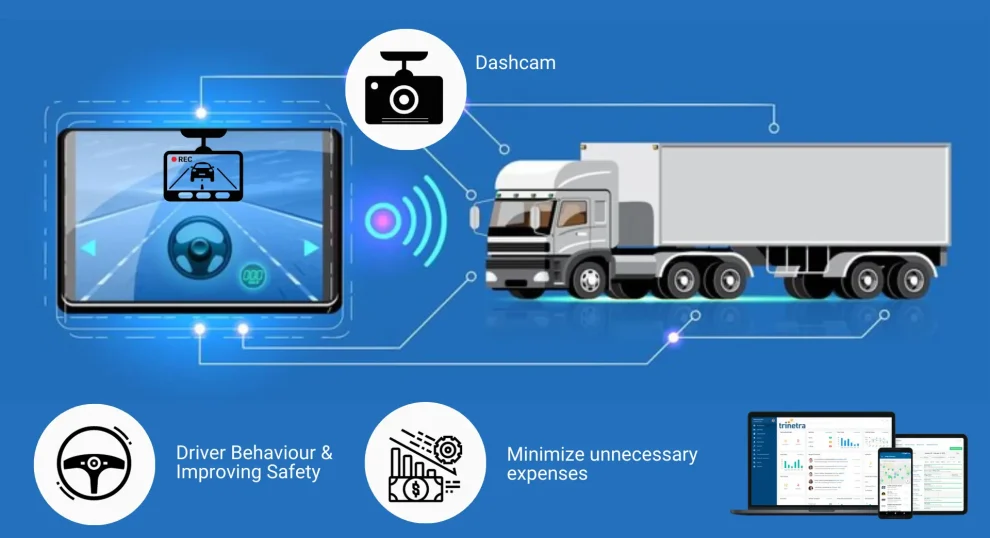The transportation industry is experiencing a revolution fueled by video telematics. This technology goes beyond traditional GPS tracking, offering a holistic view of fleet operations by combining video footage with vehicle data and analytics. Here’s a comprehensive guide to understanding video telematics, its benefits, and how it can empower businesses to optimize their fleets.
Deciphering the Black Box: What is Video Telematics?
Imagine a fleet management system that not only tells you where your vehicles are but also shows you what’s happening around them. That’s the essence of video telematics. It integrates on-board cameras with GPS tracking devices and telematics software. Cameras capture video footage of the road ahead and sometimes even the driver’s cabin. This data is then synchronized with vehicle information like speed, location, acceleration, and braking, creating a rich tapestry of information. Powerful analytics engines then process this data to generate actionable insights for fleet managers.
From Reactive to Proactive: The Transformative Power of Video Telematics
Video telematics offers a multitude of benefits that go far beyond simple vehicle tracking. Here are some key ways it empowers businesses:
- Enhanced Driver Safety: Real-time footage allows fleet managers to identify and address unsafe driving behaviors like speeding, harsh braking, or distracted driving. AI-powered video analytics can automatically detect fatigue, drowsiness, or use of mobile phones, prompting real-time alerts and coaching opportunities. This proactive approach significantly reduces the risk of accidents, protecting drivers, vehicles, and cargo.
- Improved Claims Management: In case of an accident, video footage provides undeniable evidence of what transpired. This helps businesses defend against fraudulent claims and expedites the claims resolution process, saving time and money.
- Fuel Efficiency Optimization: Analyzing driving habits can reveal areas for improvement. Video telematics can identify instances of idling, speeding, or inefficient acceleration, allowing for targeted driver coaching and route optimization. Studies show improvements in fuel efficiency by up to 20% with video telematics implementation.
- Reduced Operational Costs: By promoting safer driving behaviors and optimizing fuel consumption, video telematics can significantly minimize operational costs. Additionally, it can help detect and prevent vehicle theft or unauthorized use, further reducing losses.
- Enhanced Customer Service: Real-time tracking and ETA updates improve customer service by providing accurate delivery times. Additionally, video evidence can be used to verify deliveries or resolve any disputes that may arise.
- Improved Training and Coaching: Video footage offers invaluable insights into driver behavior, allowing for targeted coaching and training programs. Managers can identify individual needs and provide personalized instruction, leading to a more skilled and efficient workforce.

Beyond the Basics: Advanced Features of Video Telematics
Modern video telematics systems offer a range of advanced features that further enhance their value:
- In-Cabin Monitoring: Certain systems utilize cameras within the vehicle cabin to monitor driver attentiveness and adherence to safety protocols like seatbelt usage.
- AI-powered Vehicle Diagnostics: Advanced systems can analyze video footage to detect potential vehicle issues based on external factors like unusual vibrations or fluid leaks, prompting preventative maintenance and avoiding costly breakdowns.
- 360-Degree Camera Systems: This advanced setup provides a comprehensive view of the vehicle’s surroundings, minimizing blind spots and enhancing safety during maneuvers and parking.
Navigating the Landscape: Choosing the Right Video Telematics System
With a growing number of video telematics providers in the market, selecting the right system for your fleet is crucial. Consider these factors:
- Fleet Size and Needs: Choose a system that scales with your fleet size and caters to your specific needs. Smaller fleets may benefit from simpler solutions, while larger fleets may require comprehensive systems with advanced features.
- Camera Options: Consider the number and placement of cameras needed, including in-cabin monitoring if required.
- Data Security: Ensure the provider offers robust data encryption and secure cloud storage to protect sensitive information.
- Integration with Existing Systems: Choose a system that integrates seamlessly with your existing fleet management software and hardware.
- Scalability and Future-Proofing: Opt for a system that can accommodate future growth and offers the flexibility to integrate with emerging technologies.
Investing in the Future: The Rise of Video Telematics
Video telematics is rapidly transforming the way fleet managers operate. By providing a holistic view of fleet activities and driver behavior, it empowers businesses to improve safety, optimize operations, and reduce costs. As technology advances, video telematics is poised to become an indispensable tool for any company that relies on a robust and efficient fleet.
So, ditch the black box mentality and embrace the power of video telematics. It’s an investment not just in your fleet, but in the safety, efficiency, and future of your business.
















Add Comment